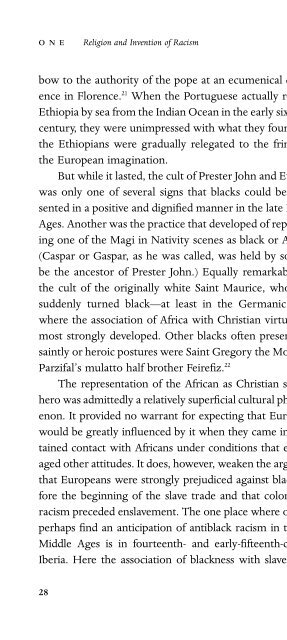Racism - A Short History - George M Fredrickson.pdf - WNLibrary
Racism - A Short History - George M Fredrickson.pdf - WNLibrary
Racism - A Short History - George M Fredrickson.pdf - WNLibrary
You also want an ePaper? Increase the reach of your titles
YUMPU automatically turns print PDFs into web optimized ePapers that Google loves.
TWO The Rise of Modern <strong>Racism</strong>(s)<br />
In their own gradual and consensual fashion, the British<br />
also moved during the first half of the nineteenth century<br />
to provide legal and political equality for Jews. Britain thus<br />
escaped the full brunt of “the Jewish question” that agitated<br />
the Continent, especially the German states. 26<br />
Ethnological discourse in the early to mid–nineteenth<br />
century focused more than before on the question of<br />
whether human beings were “of one blood,” as the New<br />
Testament proclaimed, or three to five separately created<br />
species with greatly differing aptitudes and capacities. Scientific<br />
racism of the explicitly or implicitly polygenetic kind<br />
did not take hold in England until after the mid–nineteenth<br />
century, mainly because of the strength of evangelical<br />
Christianity and its commitment to the belief that all<br />
human beings descended from Adam. James Cowles Prichard,<br />
the leading British ethnologist of the early nineteenth<br />
century, was a staunch proponent of monogenesis, but he<br />
nevertheless rejected the climatic theory of racial differentiation<br />
that had been so favored during the Enlightenment.<br />
He argued instead that changes in the physical and mental<br />
characteristics of the races were by-products of a civilizing<br />
process that Europeans had undergone, but that most darkskinned<br />
peoples had not. 27 While such a theory might not<br />
justify slavery, it was compatible with imperial expansion<br />
based on the belief that Europeans were embarked on a<br />
“civilizing mission.” French ethnology was more open to<br />
polygenesis, and the belief that the color-coded races were<br />
separate and unequal species of the genus Homo gained substantial<br />
credibility between 1800 and 1850. 28 On the other<br />
side of the Atlantic, an “American School of Ethnology,”<br />
which came to prominence in the 1840s and 1850s, pro-<br />
66
















